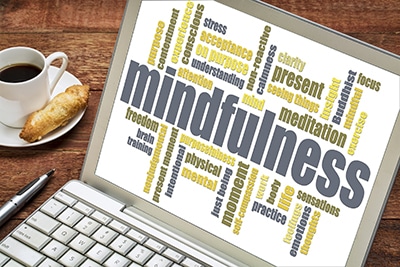The popularity of mindfulness has exploded in recent years. While the concept got its start as a source of personal wellbeing, its potential benefits for the professional world have become increasingly apparent as well.
Mindfulness vs. Meditation
Mindfulness is often confused with meditation, and the two terms are sometimes used interchangeably. While related, there are important differences. In explaining the difference, Positive Psychology uses a definition of mindfulness from John Kabat-Zinn, a popular Western writer on mindfulness and creator of the Mindfulness-Based Stress Reduction program (MBSR). Kabat-Zinn defines mindfulness as “the awareness that arises through paying attention, on purpose, in the present moment, non-judgmentally.” Meditation is one of multiple techniques that can be used to seek a state of mindfulness.
Benefits of Mindfulness
Some of the most frequently cited benefits of mindfulness for individuals are reductions in feelings of depression and anxiety. This is largely because, by encouraging a focus on the present moment, mindfulness necessarily avoids focusing on the sources of depression (over things that have happened in the past) and anxiety (over things that may happen in the future). At the group level, teams in which members practice mindfulness often find those members are more empathetic and compassionate.
Some Potential Downfalls
However, some experts caution that because mindfulness can actually increase selfish tendencies, that living in the moment can lead to narcissistically living in the moment for oneself.
“According to a new paper, mindfulness may be especially harmful when we have wronged other people,” writes David Robson in an article for BBC Worklife. “By quelling our feelings of guilt, it seems, the common meditation technique discourages us from making amends for our mistakes.” Obviously, quelling feelings of guilt, promoting selfishness or minimizing the importance of consequences are not conducive to office teamwork.
Mindfulness can be a powerful tool for personal wellbeing and group dynamics. However, mindfulness is not a silver bullet, and it can potentially impact the behavior of individuals and the functioning of groups in both positive and negative ways. As with any strategy for modifying individual and team behavior, mindfulness should be carefully and thoroughly researched and considered before applying to the office.
Lin Grensing-Pophal is a Contributing Editor at HR Daily Advisor.
The post Is Mindfulness Good or Bad for Teamwork? appeared first on HR Daily Advisor.
